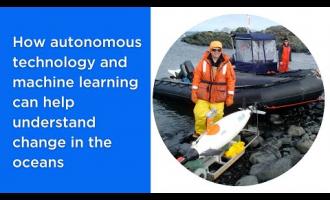Published on February 16 2022 In Webinar
Webinar 43 | How autonomous technology and machine learning can help understand change in the oceans: examples from the poles to the tropics

A presentation by Mark Patterson, Fulbright Canada Research Chair on Advancing Transdisciplinary Research on the Changing North - a chair hosted within the research programs of Sentinel North and the Institut nordique du Québec.
Abstract : The ocean often changes faster than we can observe. Our team develops new technology (autonomous vehicles, machine learning techniques, new sensors) to solve this sampling problem. I will present some examples from our past work including counting krill in Antarctica, mapping hydrothermal vents in Iceland, identifying fishes and gelatinous zooplankton from acoustic imagery, mapping coral reefs while simultaneously surveying water quality, and developing new sensors to quantify microplastics and plankton. I will conclude with some thoughts on how we can use some of these approaches to sampling remote areas like the Canadian arctic.
Speaker : Mark Patterson, Fulbright Canada Research Chair on Advancing Transdisciplinary Research on the Changing North, Université Laval. Professor of Marine and Environmental Sciences and Professor of Civil and Environmental Engineering, Northeastern University

https://www.youtube.com/watch?v=9DBWoABFjyM
Back to news

